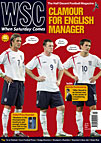 Bruce Wilkinson finds out about the added extras you have to pay on the internet in order to acquire tickets
Bruce Wilkinson finds out about the added extras you have to pay on the internet in order to acquire tickets
When the cost of watching a Premiership match can be upwards of £50 it can come as quite a shock to find that this is far from the complete price of admission to a game of football. You may have to pay several pounds in booking or administration fees; fork out to join a membership scheme or away travel club; or even have to give the club thousands of pounds for a debenture or to join a bond scheme. Whereas once you were able to turn up to a match and hand the turnstile attendant your tenner, supporters now need to be aware of a multitude of add-on costs to the advertised admission price.
You don’t walk into Tesco, pay to join the Tesco Club, pay for your shopping and then pay the supermarket for administering your purchase. So why do we do this when buying match tickets and accept it as perfectly normal?
Membership systems and away travel schemes have been around for some years now, but the charging of additional booking or administration fees is relatively new to football. The spread of the ticket agency from the United States heralded the beginning of add-on costs to ticket purchases. Agencies use booking fees as a means to take a slice of profit from the ticketing process. The UK entertainment industry gradually saw the money to be made in this way, but football was rather slow off the mark to spot the cash-spinning opportunity. There is some validity in agencies charging a fee to earn their crust, but football clubs are asking extra for the administration of their own tickets from which they already take a profit, charging you in two or even three ways if you have to pay to join a scheme before you can approach the booking fee.
And it can get worse, with clubs using premium-rate phone lines. To buy a ticket for my team Blackburn Rovers, for instance, costs 60 pence a minute to listen to a long preamble and to work your way through a computerised system before you can actually make a purchase. You can spend several pounds on hold in a queue then find out that unless you have two stubs from the team’s pre-season tour of Guatemala you are out of luck anyway.
The average booking fee is about £1.50 for each ticket purchase (rather than for each individual ticket), but Bristol City charge five per cent of the total. Wolves ask £1 per ticket and demand £5 for the privilege of then being able to buy a season ticket. Reading charge no fee, but do have a stupidly expensive phone line. Arsenal charge up to £1.80 per ticket and then another £1.60 per booking; Chelsea ask £1.50 per ticket; Manchester United demand three per cent per transaction.
A 1994 investigation into ticketing by the Office of Fair Trading found nothing inherently wrong with booking fees, but advised that such costs should be clearly displayed – all but a handful of clubs do show the extra charges on their websites. But, while the OFT research declared that the competition between agencies was fierce enough to keep the administrative charges down, the problem for supporters is that football clubs run a ticketing monopoly.
It is true that many clubs only charge the extra fees for credit card purchases over the phone. They argue that they are merely passing on the extra cost of handling a card, but the two to three per cent business cost of a card transaction is, in the rest of the retail world, subsumed in the deal. For some reason in football the purchaser has come to accept that the business cost is something that they must pay for.
Clubs point out that phoning up is one of several ways to buy tickets. This is true, but work migration has increased and fans don’t always support their local team: queuing up is no real option if you live on the opposite side of the county or country. Some clubs even charge extra when you buy tickets online.
After years of runaway ticket inflation and at a time when a number of clubs are struggling to attract a decent level of attendance, removing the hidden costs of following the game could be one small way of attracting back floating fans. The most amazing thing is that we, the supporters, seem somehow to have been hypnotised into thinking that add-on charges are acceptable.
From WSC 229 March 2006. What was happening this month